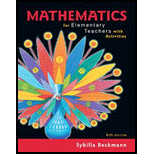
Here is Amy’s explanation for why the commutative property of multiplication is true for counting numbers:
Whenever I take two counting numbers and multiply them, I always get the same answer as when I multiply them in the reverse order. For example,
It always works that way; no matter which numbers I multiply, I will get the same answer either way I multiply them.
Discuss why Amy’s explanation is not complete. Then explain why the commutative property of multiplication is valid by viewing arrays in two ways.
Learn your wayIncludes step-by-step video

Chapter 4 Solutions
Mathematics for Elementary Teachers with Activities (5th Edition)
Additional Math Textbook Solutions
Calculus for Business, Economics, Life Sciences, and Social Sciences (14th Edition)
Algebra and Trigonometry (6th Edition)
Probability And Statistical Inference (10th Edition)
A First Course in Probability (10th Edition)
Using and Understanding Mathematics: A Quantitative Reasoning Approach (6th Edition)
- 1. Define probability: 2. Define statistics:arrow_forwarde nearest tenth. =15 2. A = 33°, B = 29°, b = 41 -b SINA" 2c Sina SinB Sin C 4. A = 30°, B = 45°, a = 10arrow_forwardFind the tangential and normal components of the acceleration vector for the curve (t) = (2t, -3t5,-3+4) at the point t = 1 ā(1) = T + N Give your answers to two decimal placesarrow_forward
- Results of tossing a coin four times: H, H, H, H How many times is the Coin expected to come up heads? How did you determine this number? Calculate the % deviation. Can these results be used to conclude that a coin is not fair? Why or why not?arrow_forwardA gun is fired with muzzle velocity 1152 feet per second at a target 4150 feet away. Find the minimum angle of elevation necessary to hit the target. Assume the initial height of the bullet is 0 feet, neglect air resistance, and give your answer in degrees.arrow_forward"Use the Opposite Method to solve the following differential equation:" 4'"""" + 34" + 34 + 4 = xarrow_forward
- For the curve defined by (t) = (e cos(t), et sin(t)) find the unit tangent vector, unit normal vector, normal acceleration, and tangential acceleration at πT t = 3 П I(3) 丌_3_3 N (1) ат aN || = = =arrow_forwardd)let X be a fin te dimension Vectors Pace over F A and S1, S2 EX S-t SICS Show that if sese for x Szbuse Sorxoknot 2) If Sa is a base for X then siis base ofx or not! 24 Jet M be a proper subset of a linear space then M is ahyper Space if for any text&M X= = {m+at/aEF}arrow_forwardFind the velocity vector for the position vector (t) = (sin(9+), 9t10, e¯7). x component = y component = Z component =arrow_forward
 Glencoe Algebra 1, Student Edition, 9780079039897...AlgebraISBN:9780079039897Author:CarterPublisher:McGraw HillAlgebra & Trigonometry with Analytic GeometryAlgebraISBN:9781133382119Author:SwokowskiPublisher:Cengage
Glencoe Algebra 1, Student Edition, 9780079039897...AlgebraISBN:9780079039897Author:CarterPublisher:McGraw HillAlgebra & Trigonometry with Analytic GeometryAlgebraISBN:9781133382119Author:SwokowskiPublisher:Cengage Algebra: Structure And Method, Book 1AlgebraISBN:9780395977224Author:Richard G. Brown, Mary P. Dolciani, Robert H. Sorgenfrey, William L. ColePublisher:McDougal Littell
Algebra: Structure And Method, Book 1AlgebraISBN:9780395977224Author:Richard G. Brown, Mary P. Dolciani, Robert H. Sorgenfrey, William L. ColePublisher:McDougal Littell College Algebra (MindTap Course List)AlgebraISBN:9781305652231Author:R. David Gustafson, Jeff HughesPublisher:Cengage Learning
College Algebra (MindTap Course List)AlgebraISBN:9781305652231Author:R. David Gustafson, Jeff HughesPublisher:Cengage Learning College AlgebraAlgebraISBN:9781305115545Author:James Stewart, Lothar Redlin, Saleem WatsonPublisher:Cengage Learning
College AlgebraAlgebraISBN:9781305115545Author:James Stewart, Lothar Redlin, Saleem WatsonPublisher:Cengage Learning





